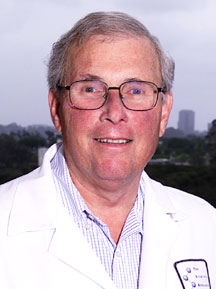Bernard Babior facts for kids
Quick facts for kids
Bernard Babior
|
|
|---|---|
 |
|
| Born | November 10, 1935 |
| Died | June 29, 2004 (aged 68) |
| Alma mater | Harvard University |
| Scientific career | |
| Fields | Hematology |
| Institutions | The Scripps Research Institute |
Bernard Macy Babior (born November 10, 1935 – died June 29, 2004) was an American doctor and scientist. He studied how our bodies work at a tiny, chemical level. Dr. Babior made important discoveries about how our immune system fights off germs.
Contents
Who Was Bernard Babior?
Bernard Babior was born in Los Angeles. He became a medical doctor at the University of California, San Francisco. Later, he earned a Ph.D. degree from Harvard University in 1965. He also trained at other famous places like The National Institutes of Health. In 1986, he moved to California. There, he worked as a doctor at Scripps Clinic. He also led the Biochemistry Division at The Scripps Research Institute.
Discovering How Our Bodies Fight Germs
Early in his career, Dr. Babior studied a special enzyme. He realized that tiny, super-active particles called free radicals might be important in our bodies. He found that our white blood cells make a very reactive substance called superoxide. This substance helps white blood cells kill invading bacteria (germs).
Understanding Chronic Granulomatous Disease
Dr. Babior's work helped explain a rare genetic disease. It is called Chronic granulomatous disease. Patients with this disease cannot fight off certain bacteria. This is because their white blood cells cannot make enough superoxide. Babior's research showed why these patients get sick easily.
How Our Defenses Can Also Cause Problems
Dr. Babior and other scientists also showed something interesting. The very "weapons" our bodies use to fight germs can sometimes cause problems. These powerful substances can play a role in common diseases. This includes conditions like arthritis, hardening of the arteries (called arteriosclerosis), and even Alzheimer's disease.
Important Recognitions
Dr. Babior received many honors for his work. He became a member of the American Society for Clinical Investigation. He was also a Fellow of the American Association for the Advancement of Science. In 1999, he was chosen to be a member of the United States National Academy of Sciences. This is a very high honor for scientists in the United States. In the same year, he became a Fellow of the American Academy of Arts and Sciences.
Sharing Knowledge
Dr. Babior helped share scientific knowledge. He served on the editorial boards of several important science magazines. These included the Journal of Clinical Investigation, Blood, and the Journal of Biological Chemistry. He wrote over 250 scientific papers. He also wrote or helped edit four books.
Bernard Babior passed away in San Diego at age sixty-eight. He is remembered for his important contributions to understanding how our bodies fight disease.
 | Aaron Henry |
 | T. R. M. Howard |
 | Jesse Jackson |

